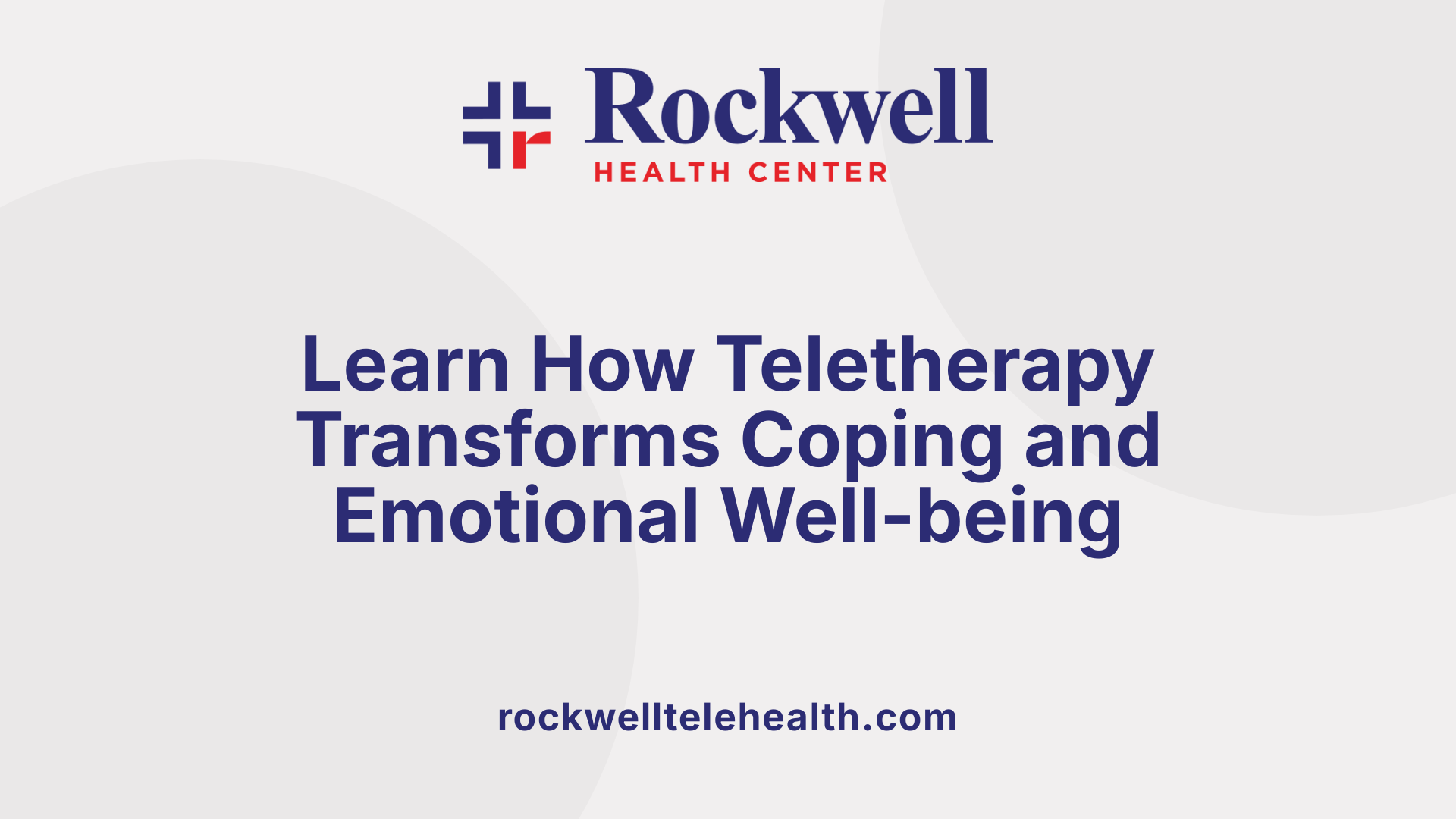Understanding Teletherapy and Its Impact on Emotional Well-being
Teletherapy programs are transforming mental health care by making support more accessible, flexible, and user-centered. Through innovative digital platforms, individuals can connect with licensed professionals via video, phone, or messaging, overcoming traditional barriers such as geography, mobility, and stigma. This article explores how teletherapy enhances coping skills and emotional health, with a focus on features, effectiveness, and the broad spectrum of available resources.
What Are Teletherapy Programs and How They Improve Coping Skills and Emotional Health?

What are teletherapy programs and how do they aim to improve coping skills and emotional health?
Teletherapy programs are online mental health services that provide therapy and emotional support through digital platforms such as video conferencing, messaging, and phone calls. These services allow individuals to connect with licensed therapists from the comfort of their own homes or any location with an internet connection.
By utilizing telehealth technology, these programs break down traditional barriers like geographic distance, transportation issues, and stigma associated with seeking in-person therapy. This increased accessibility helps more people obtain the mental health support they need.
Teletherapy offers various therapeutic modalities, including individual counseling, couples therapy, group sessions, and specialized treatments for conditions like trauma and obsessive-compulsive disorder (OCD). Many platforms incorporate evidence-based practices such as cognitive behavioral therapy (CBT), mindfulness, and acceptance and commitment therapy (ACT).
Research shows that teletherapy can be just as effective as in-person therapy for many mental health concerns, providing benefits like flexible scheduling, privacy, and immediate support options. It supports mental health improvement not just through direct therapy but also by boosting clients’ ability to develop coping skills, manage emotional stress, and build resilience.
As technology advances, teletherapy programs continue to evolve, employing innovative approaches such as virtual reality therapy or specialized programs like EMDR and ketamine treatments for trauma. Overall, these digital services play an important role in promoting emotional well-being and making mental health support more available, efficient, and personalized.
The Role of Teletherapy in Supporting Emotional Well-being
How does teletherapy increase access to mental health services?
Teletherapy significantly broadens the availability of mental health care by removing common barriers such as geographical location and transportation issues. People living in remote or rural areas often face limited local mental health resources, but through telehealth platforms, they can connect with licensed therapists regardless of distance. This flexibility is especially crucial for individuals with mobility challenges or busy schedules.
Furthermore, teletherapy's convenience allows users to schedule sessions at times that best fit their routines, increasing the likelihood of consistent care. Many platforms also offer various formats including video calls, phone sessions, and messaging options, making support accessible from the comfort of home. Insurance coverage for telehealth services, including Medicaid and Medicare, further facilitates access, although coverage specifics can vary.
What methods of delivery and support modalities are available?
Online therapy services utilize multiple methods to deliver mental health support. These include:
- Video-based therapy: Real-time face-to-face sessions that mimic in-person visits.
- Phone consultations: Ideal for those without reliable internet or video capabilities.
- Messaging platforms: Asynchronous text exchanges for ongoing support and crisis response.
Specialized programs focus on particular issues such as trauma, OCD, or grief. Platforms like Innerwell offer evidence-based therapies including EMDR and ketamine therapy for trauma recovery. Others like NOCD and The Dinner Party provide targeted treatment for OCD and grief respectively. Additionally, support groups and peer communities, such as those on 7 Cups, facilitate emotional support and reduce loneliness.
What does research say about the effectiveness of online therapy?
Studies have consistently shown that teletherapy is comparable to traditional in-person therapy in terms of accuracy, treatment outcomes, and patient satisfaction. Research from the National Center for Health Research indicates that online mental health services effectively address conditions like depression, anxiety, PTSD, and trauma.
Platforms that follow professional standards and HIPAA privacy regulations maintain confidentiality and safety. Evidence suggests that online therapy can produce high levels of engagement and positive outcomes, especially when clients are committed and sessions are facilitated by skilled therapists.
In summary, teletherapy plays a crucial role in supporting emotional well-being by providing flexible, accessible, and effective mental health services. As technology advances and regulatory frameworks adapt, virtual care continues to grow as a trusted solution for diverse mental health needs.
Features and Benefits of Online Therapy Options
What features and benefits do online therapy options offer for improving emotional resilience and overall well-being?
Online therapy provides a range of features that support the development of emotional resilience and enhance overall mental well-being. One significant advantage is increased accessibility. People living in remote areas, those with mobility challenges, or individuals facing transportation barriers can access professional mental health care from the comfort of their homes. This convenience not only reduces logistical obstacles but also helps diminish the stigma often associated with seeking mental health support.
A major benefit is the flexibility of scheduling and communication modes. Clients can choose from video calls, messaging, or phone sessions, allowing them to select the format that best fits their lifestyle and comfort level. This adaptability encourages consistent engagement with therapy and makes treatment more sustainable.
Cost and insurance considerations also play a role in the appeal of online therapy. Many platforms offer more affordable options than traditional in-person services, with session costs typically ranging from $55 to over $200. While insurance coverage varies, many providers accept health plans, Medicare, or Medicaid, making therapy more accessible financially.
Research indicates that online therapy can be as effective as face-to-face treatment for a variety of mental health issues, including anxiety, depression, and trauma. The safe, private environment of virtual sessions fosters openness, allowing individuals to explore sensitive topics more comfortably.
Moreover, the availability of specialized programs and coordinated care options helps tailor treatment to individual needs, supporting personalized growth and emotional resilience. Overall, the convenience, privacy, and proven effectiveness of online therapy make it a valuable tool for strengthening mental health and fostering resilience in everyday life.
How Teletherapy Enhances Emotional Health and Coping Skills

How do teletherapy programs work to enhance emotional health and coping capabilities?
Teletherapy programs operate by connecting individuals with licensed mental health professionals via digital platforms such as video calls, messaging, or phone conversations. These online services are designed to be highly accessible and convenient, removing many traditional barriers to mental health care.
Using evidence-based methods like cognitive behavioral therapy (CBT), mindfulness exercises, and mood tracking apps, teletherapy helps individuals improve their emotional well-being and develop practical coping skills. For example, platforms like Talkspace and BetterHelp offer various formats—including messaging, audio, and video sessions—that ensure users can choose what best fits their lifestyle.
Beyond just providing therapy, these digital platforms enable clinicians to observe family interactions and environmental factors in real-time, which can lead to more personalized treatment approaches. Many programs include specialized interventions such as exposure therapy for trauma or OCD and mindfulness-based stress reduction.
One of the main advantages of teletherapy is its ability to overcome barriers like geographical location, transportation issues, and scheduling conflicts. Vulnerable populations such as children, teens, or those living in remote areas find it easier to access mental health support through these online services. Additionally, virtual therapy offers a sense of privacy and reduces the stigma associated with seeking mental health care.
Research shows that teletherapy can be just as effective as in-person sessions when delivered by qualified professionals. Its scalable nature allows mental health services to reach more people, providing not only immediate emotional support but also tools that empower individuals to manage stress, depression, anxiety, and trauma proactively.
In summary, teletherapy works by combining flexible digital access with proven therapeutic techniques, creating a supportive environment that fosters emotional resilience and equips individuals with essential coping skills for their everyday lives.
Effectiveness of Online Mental Health Services
 Research indicates that online mental health services are largely effective across a variety of emotional and psychological conditions. Multiple studies and meta-analyses have shown that telehealth therapy can lead to positive clinical outcomes comparable to traditional in-person treatments. For example, treatments for depression often result in medium to large improvements, with specific evidence supporting the use of online cognitive-behavioral therapy (CBT).
Research indicates that online mental health services are largely effective across a variety of emotional and psychological conditions. Multiple studies and meta-analyses have shown that telehealth therapy can lead to positive clinical outcomes comparable to traditional in-person treatments. For example, treatments for depression often result in medium to large improvements, with specific evidence supporting the use of online cognitive-behavioral therapy (CBT).
Most research has focused on conditions such as anxiety, depression, obsessive-compulsive disorder (OCD), and post-traumatic stress disorder (PTSD). Notably, children, teens, and young adults participating in online therapy programs have demonstrated encouraging recovery results.
Many reputable platforms utilize guided interventions, which tend to outperform self-guided modules, underscoring the importance of therapist support even in digital formats. The accessibility, lower costs, and convenience of online therapy have increased its adoption, making mental health care more reachable for diverse populations.
However, online therapy does have limitations. Technical problems, reduced ability to interpret body language, and confidentiality issues can pose challenges. Furthermore, individuals with severe mental health conditions may require more intensive, in-person care.
Overall, when tailored to individual needs and administered with appropriate safeguards, online mental health services stand as a valid, often effective, alternative or supplement to face-to-face therapy. As research continues, the understanding of ideal applications and constraints is deepening, supporting broader and more effective implementation.
Digital Resources and Tools in Teletherapy
 What types of digital mental health resources and tools are available through teletherapy?
What types of digital mental health resources and tools are available through teletherapy?
Teletherapy has broadened access to mental health support through a variety of digital tools and resources designed to complement traditional therapy. Most platforms enable individuals to connect with licensed therapists via video, phone, or secure chat, making mental health care more convenient and accessible.
Alongside live sessions, digital mental health apps play a significant role. Apps like Headspace, Calm, and others facilitate mood tracking, guided meditation, cognitive-behavioral exercises, and relaxation techniques, empowering users to manage their mental wellness independently and anonymously.
Structured online programs using evidence-based techniques such as CBT (cognitive-behavioral therapy), mindfulness, and acceptance and commitment therapy (ACT) are also prevalent. These interventions provide accessible treatment modules that can be integrated into broader care plans.
Telepsychiatry expands support to medication management and psychiatric consultations, often delivered through secure virtual platforms. This alleviates barriers caused by geographic or transportation issues.
Emerging technologies are shaping the future of digital mental health care. AI-powered chatbots like Woebot and Wysa offer immediate, personalized support and symptom assessment, acting as virtual companions and symptom trackers. They provide coping strategies and emotional support between therapy sessions.
Innovative tools such as virtual reality (VR) therapy enhance remote treatment by immersing patients in controlled environments used for exposure therapy, particularly beneficial for anxiety and trauma.
Wearable devices also contribute by monitoring physiological signs like heart rate and sleep patterns, providing real-time data that therapists can use to tailor interventions.
These technological innovations not only increase the flexibility of mental health services but also enhance engagement and provide continuous support beyond traditional sessions, making mental health care more dynamic and responsive.
Choosing the Right Teletherapy Program: What to Consider?
Therapist qualifications and specialties
When selecting an online therapy platform, it's important to look for licensed professionals such as counselors, social workers, and marriage & family therapists. These therapists are trained in evidence-based approaches like cognitive behavioral therapy (CBT), dialectical behavior therapy (DBT), acceptance and commitment therapy (ACT), and mindfulness techniques. Some platforms, like NOCD, focus specifically on treating OCD, while others, such as Innerwell, offer trauma-focused care including EMDR and ketamine therapy. Ensuring that the therapist's expertise aligns with your specific concerns, whether it's grief, trauma, or anxiety, can significantly enhance treatment outcomes.
Cost, insurance, and accessibility
Online therapy services typically range from $55 to over $200 per session, making them more affordable than traditional in-person therapy. Many platforms accept various insurance plans, including Medicaid and Medicare, although coverage can vary by state and provider. Affordable options like 7 Cups even offer free emotional support via chat with caring listeners. Additionally, telehealth improves access by eliminating transportation barriers and allowing sessions from home, which is especially beneficial for those with disabilities, chronic illnesses, or living in remote areas.
Technology requirements and user experience
Participating in teletherapy generally requires a device with a camera and microphone, such as a smartphone, tablet, or computer, along with a reliable internet connection. Most reputable platforms are HIPAA-compliant, ensuring your privacy and data security. They often support multiple formats, including video, phone, and messaging, providing flexibility. Easy therapist matching and seamless switching options are common features that help users find the right fit. A positive user experience, such as straightforward scheduling and clear instructions, promotes consistency and satisfaction with your treatment.
| Aspect | Details | Considerations |
|---|---|---|
| Therapist Qualifications | Licensed professionals, specialists in areas like trauma, OCD, grief | Verify credentials, look for specialties that match your needs |
| Cost & Insurance | $55 - over $200 per session, insurance coverage varies | Check your plan, seek affordable options, look for free support services |
| Technology & Usability | Video, audio, chat formats, HIPAA-compliant platforms | Ensure compatible device, stable internet, user-friendly interface |
Choosing the right online therapy requires assessing these factors to ensure effective, accessible, and comfortable care tailored to your needs.
Conclusion: Making Teletherapy Work for You
 Online therapy through telehealth platforms has proven to be an effective and flexible way for many individuals to access mental health care. Its convenience, privacy, and affordability make it an attractive option for people seeking support for anxiety, depression, trauma, and other emotional challenges. The variety of formats—including video calls, messaging, and phone sessions—allows users to choose what best fits their lives and preferences.
Online therapy through telehealth platforms has proven to be an effective and flexible way for many individuals to access mental health care. Its convenience, privacy, and affordability make it an attractive option for people seeking support for anxiety, depression, trauma, and other emotional challenges. The variety of formats—including video calls, messaging, and phone sessions—allows users to choose what best fits their lives and preferences.
These platforms also broaden access to specialized treatments, such as EMDR for trauma or programs dedicated to OCD or grief, enabling targeted support for specific needs. As research continues to support the effectiveness of online therapy, the future promises even more innovative digital mental health solutions. Advances in telehealth technology are likely to enhance the quality, accessibility, and personalization of care.
Looking ahead, combined efforts in regulation, technology, and research will shape a digital mental health landscape that prioritizes privacy, convenience, and user engagement. The ongoing development of evidence-based online interventions and integration with traditional care will help make mental health support more approachable and attainable for all.
Harnessing Technology for Better Emotional Health
Teletherapy programs are at the forefront of a new era in mental health care. They provide accessible, effective, and personalized support that can significantly improve coping skills and emotional health. With continuous advancements in technology and an expanding array of digital tools and resources, teletherapy is set to become an even more integral part of lifelong mental health management. Embracing these innovations can empower individuals to build resilience, recover from emotional setbacks, and lead fulfilling, balanced lives in an increasingly interconnected world.
References
- 18 Best Therapist-Approved Online Therapy Platforms in ...
- The Best Online Therapy, According to a Therapist
- 7 Cups | Free Online Mental Health Support; Therapy ...
- Teletherapy Counseling Services
- Digital Mental Health: Apps, Teletherapy, and Online ...
- 10 Best Online Therapy Services In 2025: Tried And Tested
- Telehealth for Mental Health
- Online Mental Health Services - Remote Pychotherapy ...
- Telehealth and Beyond: Promoting the Mental Well-Being ...
























































































.png)